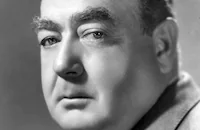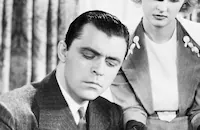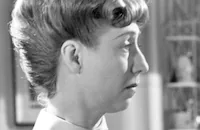Sensations of 1945
Cast & Crew
Andrew Stone
Eleanor Powell
Dennis O'keefe
C. Aubrey Smith
Eugene Pallette
Mimi Forsythe
Film Details
Technical Specs

Synopsis
As dancer Ginny Walker performs on stage, a veiled woman in the audience stands up, accuses Ginny of stealing her husband and then fires a gun at her. After Ginny collapses and is taken to her dressing room, the woman, Julia Westcolt, a friend of Ginny's, dashes backstage, discards her veil, and then congratulates her friend on their successful publicity stunt. When Ginny's press agents, Gus Crane and his son Junior, visit their client backstage, she brags about her feat and chides them for not being more creative in promoting her. Horrified at Ginny's brashness, Junior, a conservative Harvard graduate, chastises her and leaves the room. In his absence, Ginny conspires with Gus to teach his son a lesson. The next morning, when Junior arrives at the office, he finds Ginny seated at his father's desk and she coolly informs him that Gus has given her control of the business. Ginny scrutinizes the books and discovers that three of their clients, a restaurateur, a circus owner and the manager of a ballet, are unable to pay their bills. After accusing Junior of failing to promote them properly, Ginny conceives of the idea of combining the three talents in one tent under the rubric "Circus in the Sky." Circus in the Sky becomes a smashing success, and Ginny signs "The Great Gustafson," a wirewalker, as a client and bets Junior that she can make him front-page news. Ginny wins her bet when the papers headline Gustafson's death-defying plan to cross the 1,000-foot Royal Gorge on a wire cable, but Junior chides her for risking her client's life to achieve her goal. After Gustafson safely completes his challenge, Junior and Ginny return to their New York office, where Dan Lindsay, a retired Broadway producer, approaches them about selling his memoirs. Feeling sorry for the once illustrious but now impoverished producer, Junior welcomes Dan as a client. When Collins, the owner of the Plantation Club, hires Ginny to promote his club, she arranges for the acts to be projected on an outside wall of the club across from Times Square, thus causing a near-riot. The police then arrest Ginny for disturbing the peace and she spends the night in jail. Next, Ginny announces her new idea to hire Dan on a weekly salary to host the Gay Nineties Club. Junior applauds her for arranging a steady income for the elderly producer until he discovers that Ginny has secured ten percent of the club's profits for the agency and has hired Dan to exploit his loyal show business friends, including W. C. Fields, who has offered to perform for free. Angered by Ginny's selfishness, Junior gives Dan the agency's ten percent and then informs Ginny that he is leaving the business to re-enlist in the Army. After Junior re-enlists, Gus tells Ginny that he was hoping that she and Junior would fall in love. When Ginny protests that she thought that Junior loved Chloe Connor, the owner of the dancing horse Starless Night, Gus explains that Chloe was only a client and that Dan was concerned about her welfare because she had been forced to retire after a bad fall. To make amends, Ginny decides to perform with Starless Night and donate the proceeds to Chloe. After weeks of training, Ginny is ready to perform with the horse. On opening night, Junior, touched by Ginny's selflessness, appears backstage and proclaims his love for her.

Director

Andrew Stone
Cast

Eleanor Powell

Dennis O'keefe

C. Aubrey Smith

Eugene Pallette
Mimi Forsythe

Lyle Talbot
Hubert Castle

W. C. Fields

Sophie Tucker
Dorothy Donegan
The Christianis
Pallenberg Bears

Cab Calloway
Woody Herman
Richard Hageman

Marie Blake
Stanley Andrews

Louise Currie
Betty Wells
Bert Roach
Grandon Rhodes
Earl Hopkins
Constance Purdy
Joe Devlin
George Humbert
Anthony Warde
Ruth Lee
David Lichine
Wendell Niles
Mel Hall
Joet Robinson
Marjorie Tallchief
Carmen Clifford
Betty Marion
Gene Rodgers
The Les Paul Trio
The Copelands
Johnson Brothers
The Huberts
Starless Night, A Horse
Willie Pratt
Teddy Shapiro
Crew
Eleanor Behm
Dorothy Bennett
Carley Harriman
Frederick Jackson
Henry Kesler
Ted Larsen
David Lichine
William Lynch
Peverell Marley
Mahlon Merrick
John Mescall
James Nasser
Charles O'curran
Charles Odds
Scotty Rackin
Leon Schlesinger
Al Sherman
James E. Smith
Andrew Stone
Andrew Stone
Andrew Stone
Harry Tobias
Maurice Yates

Film Details
Technical Specs

Award Nominations
Best Score
Quotes
Trivia
'Eleanor Powell' 's final starring role in a movie. After this, she would make cameos in films only.
Notes
The working titles of this film were Sensations and Sensations of 1944. According to a Hollywood Reporter news item, the studio decided to change the title from Sensations of 1944 to accommodate a longer run at the theaters. Although onscreen credits note that the film contained ten original songs, only nine songs were performed in the picture. Other Hollywood Reporter news items yield the following information about the production: The film was initially to be shot in Cinecolor, but was later changed to black and white because of the technical difficulties associated with color. Producer-director Andrew Stone decided to satisfy audience craving for circus entertainment, which had been curtailed by wartime travel restrictions, by grouping six specialty acts in the number "Circus in the Sky." Leon Schlesinger devised an animated sequence for the film to illustrate Cab Calloway's "jive talk." Hollywood Reporter news items add the following performers to the cast: Katherine Dunham and her dancers; Captain Heyer, the owner of Starless Night; Uncle Willie and Patsy; Robert Dudley; Eddie Chandler; Charles Phillips; Barbier; Charles Hiby; Sam Lufkin and Bill Wolfe. Their appearance in the released film has not been confirmed, however. Although pre-production news items announced Bobby Connolly as choreographer, the extent of his contribution to the released film has not been determined.
Reactions to an April 1944 sneak preview led Stone to add scenes featuring W. C. Fields, according to a Hollywood Reporter news item. This film marked Fields's last screen appearance, and was Eleanor Powell's first role since leaving M-G-M. The War Department delayed release of this picture because it objected to scenes showing soldiers behaving in an undignified manner, according to a June 1, 1944 Hollywood Reporter news item. A November 1944 Hollywood Reporter news item adds that vaudeville comic Pat Henning sued Andrew Stone Productions for editing his performance out of the film and denying him screen credit. The outcome of that suit is unknown.












